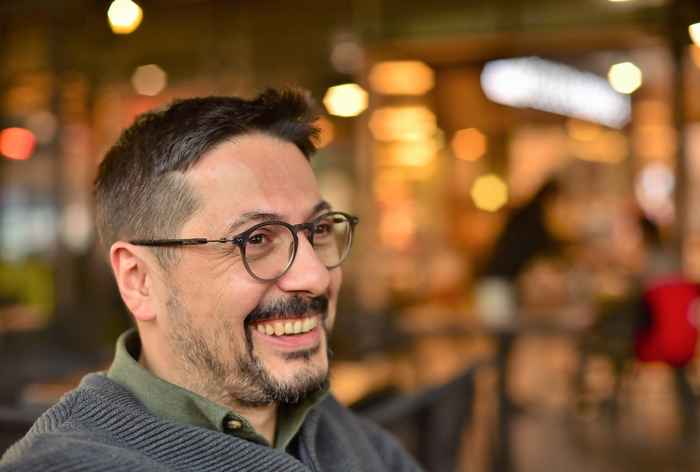‘The combination of operations research and data science is like a happy marriage’
3 March 2021

At first, Birbil felt most at home with the mathematical side of operations research and management science, but he remembers exactly when data science caught his attention. ‘It was in 2011 when I took a sabbatical year and left for Cornell University. Once there, I had the time and space to simply think about my field of expertise. It was a period when data science in combination with operations research was becoming increasingly relevant. I had a hunch that this field would start booming in the next few years so I shifted my line of work more and more in that direction.’ As Birbil had expected, the combination between these disciplines indeed turned out to be a happy marriage. ‘The data science community keeps coming up with interesting new findings which, in turn, I can use in data-driven applications to optimise existing decision-making models.’
Tried and trusted
Birbil was born and raised in Istanbul, Turkey. In 2018, he moved to Utrecht with his wife and two children to take up a job as Professor of Data Science and Optimisation at Erasmus University in Rotterdam. Having already worked there before, ‘Going back felt like a homecoming. I still knew many professors from the time, straight after getting my PhD, when I was a post-doc there.’
So why the decision to switch to UvA? ‘Initially I thought I wouldn’t really fit in with Amsterdam Business School because I’m more into maths than business. That’s until I heard Prof. Dick den Hertog was also going to join. Den Hertog is a highly regarded name in operations research. He’s the co-founder of the Analytics for a Better World initiative and also well-grounded in theory. In this sense, he’s like Prof. Joaquim Gromicho, an old friend and co-author of mine. I felt reassured by their move to UvA.’ In addition, Birbil sees the benefits of business sector collaboration with ABS behind him. ‘This enables you to translate knowledge into practical applications and also leaves you with valuable contacts.’
You may well wish to work together efficiently but not if you then run the risk of allowing information about your company to fall into the wrong hands.
Unboxing privacy and interpretability
Birbil is looking forward to starting his research at ABS. ‘My focus will be on challenging issues within decision-making. One such issue is privacy. In the future, companies will have to work together and share resources in order to make their business operations more sustainable. As an example, two companies can each have 100 half-empty lorries drive around or together they can completely fill 100 lorries. In principle, this is an elementary resource allocation problem but, when you add in the challenges surrounding privacy, you’re suddenly confronted with a rather tricky problem. You may well wish to work together efficiently but not if you then run the risk of allowing information about your company to fall into the wrong hands. The question is then: can we develop methods that safeguard this type of data privacy in the decision-making process?’
Another subject Birbil finds fascinating is interpretability. ‘Nowadays, we’re using more and more algorithms. A bank, for instance, relies on numerous mathematical algorithms largely based on machine learning. When somebody applies for credit, an algorithm checks whether the person in question is eligible. This algorithm is a black box; we don’t know exactly how it works, just that it does indeed work. However, in this day and age, there is a growing demand from the government and society for transparency. We should be able to show how we arrive at a decision. So how do we do that? We must either make explicit the decision-making process underlying such a black-box algorithm or completely drop the black-box model as an intermediate step. A focus on interpretability can have a huge effect on society.’
When it’s a question of medical solutions, you want to be able to find out why a specific algorithm works so you can apply it more broadly.
For a better world
A direct impact on society is something that appeals to Birbil in any case. That’s why he hopes to be in a position to play a role in the Analytics for a Better World initiative. ‘I’ve already attended many of their lectures about transport, the last one being about the shipment of blood to Africa. Here, proper transport is vital. But there are many challenges like technology or the distribution network, just to name a few. They want to use analytics to optimise the collection and distribution of blood and so improve the quality of life.’ Birbil hopes he will be able to contribute to this goal through his research on decision models. ‘Here again, interpretability is key. When it’s a question of medical solutions, in particular, you want to be able to find out why a specific algorithm works so you can apply it more broadly.’
Having said that, Birbil will use his first year mostly to build the business analytics post-graduate programme. The bachelor’s course is already up and running but Birbil has some ideas for the master’s degree. Just like our students, our programme should realise a strong link with industry. To achieve this, I’m going to get in touch with several interested companies so they can provide us with talks and case studies about real-world problems. I can tell my students all about the technical details of data science and optimisation, but they should also get their hands dirty in the real world and process what they’ve learnt through practical application.’